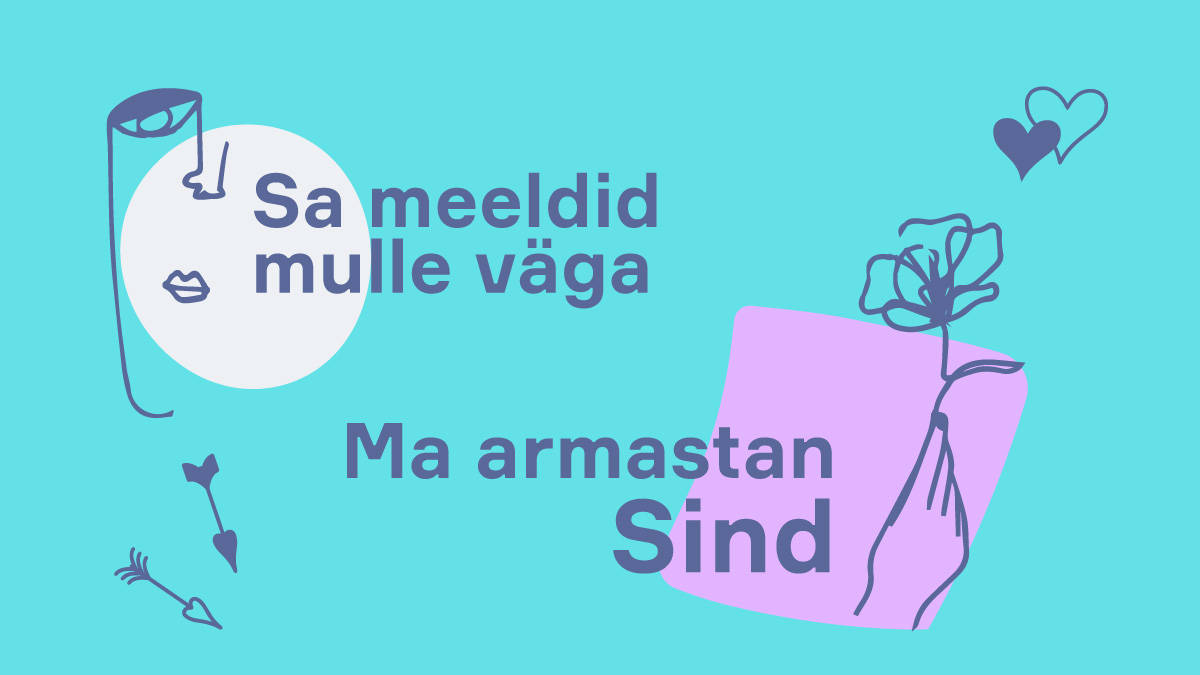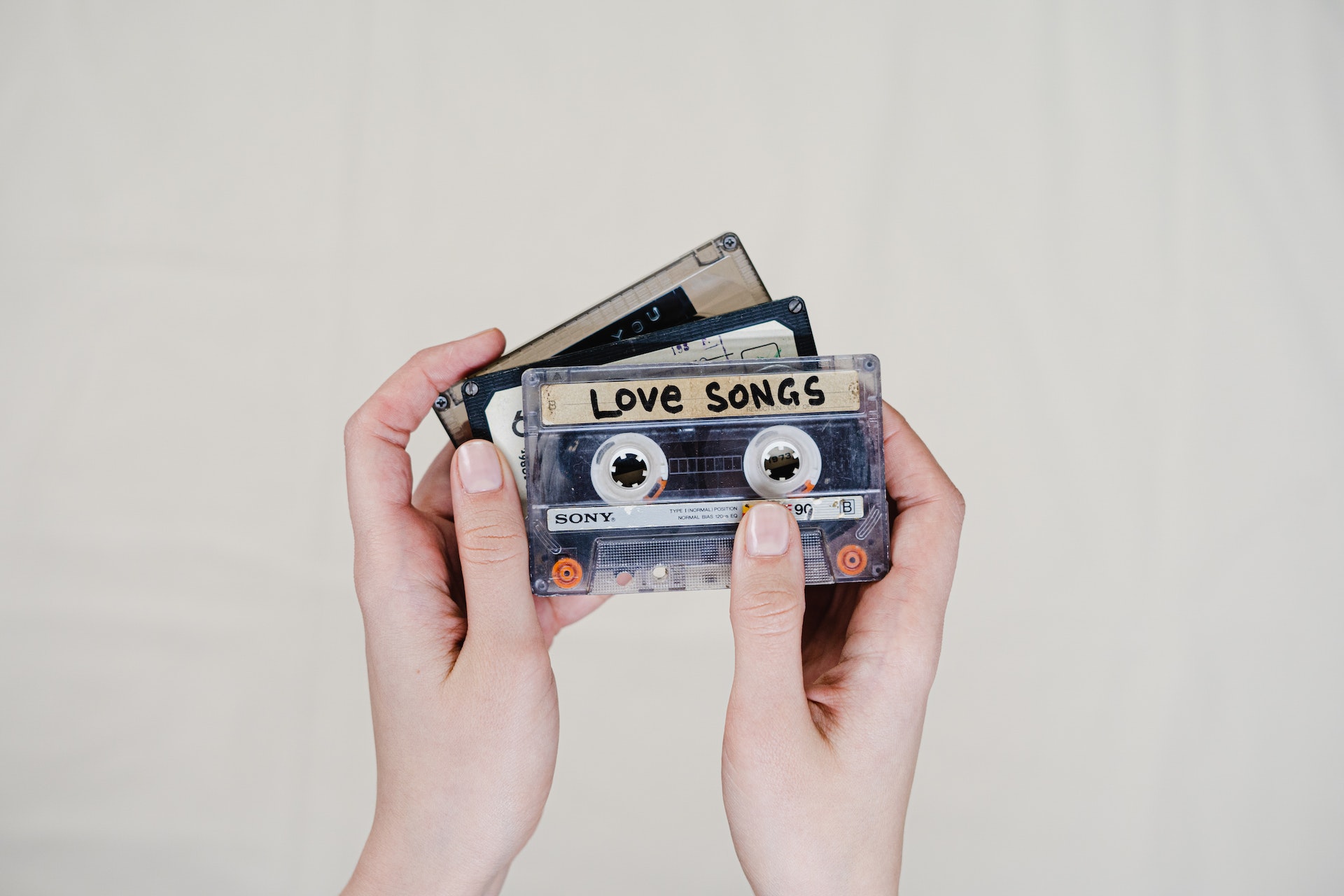The Estonian language isn’t famous for being overly romantic like French or Spanish. Most people don’t even know where Estonia is, but that doesn’t mean that Estonians don’t have their romantic side.
It’s also said that Estonian is a singing language. That’s because Estonian words contain many vowels, which gives the language a kind of singing quality. We’ve gathered an expansive list of phrases and expressions here that you can use with your Estonian partner or loved one.
If your loved one is Estonian, then this article will help you learn some very useful phrases to show how you feel about them. And, who knows, this might also convince you to try Lingvist’s Estonian language course.
Let’s begin!

Learn with Lingvist now
Expressing your love and feelings
Saying “I love you” doesn’t happen all that fast in Estonia: people take time to warm up to each other. Depending on the phase of your relationship, you can find some useful expressions in this list.
Ma armastan sind – I love you. This is something you say to your long-term partner or family members. Remember to say all three of these words, though. If you drop Ma from the beginning and just say Armastan sind, it sounds far less serious and similar to something that you could say to your friend.
Ma armastan sind ka – I love you too. This can be said as a response to Ma armastan sind.
Ma olen sinusse armunud – I am in love with you. It’s very similar to Ma armastan sind, but you only say it to your partner and not anyone else.
Ma armastan sind kogu südamest – I love you with all my heart.
Kas sa armastad mind? – Do you love me?
Sa meeldid mulle – I like you and Sa meeldid mulle väga – I like you a lot
Ma igatsen sind – I miss you and Ma igatsen sind nii väga – I miss you so much
Sa oled mu jaoks kõige kallim inimene maailmas – You’re the most important person in the world to me.
Sa oled mulle kallis – You’re dear to me.
Ma olen sinu järele hull – I am crazy about you.
Ma ei suuda sinuta elada – I can’t live without you. Be careful about using this one so that it doesn’t come off as desperate, as it’s more intense and Estonians aren’t often that intense themselves.
Kas sa abielluksid minuga? – Would you marry me?
Anna musi – Give me a smooch. Using the word musi sounds more playful and cute than saying Suudle mind – Kiss me.
Sinuga on alati tore – It’s always great to be with you. You can say this phrase to your friends and family too. It doesn’t need to have any romantic feelings behind it.
Estonian terms of endearment
Musi or musu – smoochie
Kallis – dear (literally means expensive)
Kallim – the dearest (the most expensive)
Kullake – darling
Kullakallis – the dearest (literally expensive as gold)
Kullatükk – piece of gold
Tibu – baby bird/chick
Mu arm – my love
Silmarõõm – happiness of the eye
Päikesekiir – sunray
Armsake – cutie
Musirull – roll of smooches
As you can see, the word kallis comes up a lot in these terms of endearment. It actually makes sense, because if someone is kallis to you, then they’re usually the most precious person in your life.
In Estonian there is also the ending -ke, which makes everything sound cuter. You can apply this ending to most words in this list: musike, musuke, kallike, kallimake, kullake, kullakallike, tibuke, silmarõõmuke, päikesekiireke, armsake, musirullike. You can make them sound even cuter by adding the -kene ending. Here are a few examples: musikene, tibukene, musirullikene.
Maybe you noticed that we left out mu armuke; this is because armuke means a lover or mistress in Estonian. You wouldn’t want to say that to your Estonian partner.
Here are some other ways to refer to your partner. You wouldn’t refer to your partner as musirullikene when talking about them to your friends or family, so the following words are very good replacements to know.
Mees – husband (literally “man”); naine – wife (literally “woman”). In Estonian there is no specific word for husband or wife, we just call our spouses mees or naine.
Kaasa – spouse. This word can refer to either your husband or wife.
Poiss-sõber – boyfriend; peika – boyfriend (slang); tüdruksõber – girlfriend; pruta – girlfriend (slang). Peika comes from the word peigmees, which means groom. And pruta comes from the word pruut, which means bride. Obviously, since they’re slang terms, no one is thinking that this person they’re referring to is their future groom or bride. Nowadays, it’s also common to refer to your boyfriend as your poiss (boy) and your girlfriend as tüdruk (girl).
Elukaaslane – life partner. This is also a way to refer to your partner, and it can be said about your boyfriend or girlfriend.
Estonian proverbs about love
Armastus käib kõhu kaudu – Love goes (walks) through the stomach. This is a well-known saying in Estonia. It means that the way to someone’s heart is to impress them with good food.
Armastus on pime – Love is blind. When you love someone, you notice only good things about them.
Vana arm ei roosteta – An old love doesn’t rust. Vana arm ei hallita – An old love doesn’t get moldy. When you’ve loved someone before but aren’t together anymore, it doesn’t mean that the feelings are gone.
Armastus ei ole kartul, et sa ta ära sööd – Love is not a potato that you can just eat. A potato is something that you eat and it’s gone. Love isn’t usually so short-lived.
Armastusel on kakskümmend paari silmi peas – Love has twenty pairs of eyes in its head. When you’re in love you only have eyes for that person.
Estonian music about love
Music is a great way to get some exposure to the language that you’re learning. So, if you’re learning Estonian and also like listening to music, then give some of these songs a listen.
Mis värvi on armastus (What is the color of love) by Uno Loop. This is an old song that every Estonian knows.
Suudlus läbi jäätunud klaasi (A kiss through a frozen glass) by Ruja. Another well-known song about love. If you listen to Estonian radio stations, you will hear this song played a lot during the winter.
Tuulevaiksel ööl (On a windless night) by Liisi Koikson and Marko Matvere.
Leekiv armastus (A fiery love) by Genialistid and Lea Liitmaa.
Põlen sinu ees (I burn in front of you) by Ines.
Estonian poetry about love
If you want to show your romantic side, why not send a poem to your loved one? Even better, learn the poem by heart and recite it to them yourself. The author of this next poem is Virge Kollamaa.
Oled mu südames
Rändab mu peas vaid üks mõte,
löömab mu sees pisike lõke.
Ärevus võtab üle kogu mu keha,
selle vastu ei saa ma midagi teha.
Igatsus suur painab mind,
näha ma juba tahaksin sind.
Tahaks tunda mu ümber su käsi,
sinuga olemisest ma ei väsi.
Lõputult võiks ma vaadata sind,
sinu embusest ei väsi mu hing.
Tahaksin olla juba su juures,
sest oled sa, mu südames suures!
You are in my heart
There is only one thought wandering in my head,
a tiny fire is burning inside me.
Anxiety takes over my whole body,
I can’t do anything about it.
Longing is weighing me down,
I would already like to see you.
I would want to feel your arms around me,
I never tire of being with you.
I could look at you endlessly,
My soul never tires of your embrace.
I’d like to be with you already,
For you are, in my big heart!
Common Estonian phrases about love
Estonian | English |
Parimate soovidega | With best wishes |
Flirtima | To flirt |
Suudlema | To kiss |
Külge lööma | To hit on someone |
Armuma | To fall in love |
Armastama | To love |
Välja kutsuma | To ask someone out |
Armastus esimesest silmapilgust | Love at first sight |
Kõrvuni armunud olema | To be in love up to the ears |
Käima | To date (this verb has several meanings) |
Kallistama | To hug |
Musitama | To smooch |
Abielluma | To get married |
Vabaabielu | Free marriage (You live together like spouses but you aren’t married) |
With these Estonian phrases and verbs, it isn’t enough just to know them: you also need to use the correct pronoun and tense. For example, if you want to say that you’re in love up to your ears, you would say Ma olen kõrvuni armunud. You can see that in the infinitive form of kõrvuni armunud olema, the part of the verb that changes, olema, is at the end. However, you need to flip it around when you start using it with a pronoun.
You can learn these and many other words and phrases with our Estonian language course. With Lingvist, you can improve your Estonian skills very quickly with just 10 minutes of study per day. As a first-time subscriber, you can also sign up and enjoy our free trial to see how powerful our learning method really is.
Romantic Estonian Phrases Poster
Feel free to print it for your study area, or share it on your website or blog.



